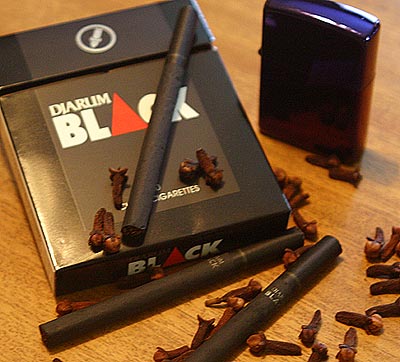Ban on clove cigarettes doesn’t make sense
A few days ago I wrote a post on the The Family Smoking Prevention and Tobacco Control Act and how it would effectively ban clove cigarettes on September 22 (along with all other flavored cigarettes except menthols.) Apparently I am not the only one who finds this particular provision of the bill to be backward. In fact, since making that post, traffic to this blog has more than tripled (and to think, I thought everyone came to read my ponderings on how the Babylonian exile contributed to the concept of an afterlife.)
Earlier I made a few comments on how ludicrous it was to assume that banning flavored cigarettes would decrease smoking among minors. Sure kids like sweet flavors, but guess what… adults do too. I mean seriously, how many kids do you know rolling up a pack of Djarum Blacks in their shirt sleeves? If we extend this line of thinking, it is scary to think what else might be banned. What about sweet liquors? I know lots of underage youth who like flavored vodka and Jagermeister and schnapps. Aren’t these possibly contributing to underage drinking? Probably a lot more than clove cigarettes are contributing to underage smoking — and really, which one is more harmful? I would say the drinking. At least you can die a lot quicker with alcohol than you can with smoke.
Does this ban really affect me that much? No, not really me personally. But does it irk me? Absolutely.
Some people are always bashing big government and think any law is infringing on their rights. I am not part of that crowd, but at the same time I do get frustrated when laws don’t make sense and unfairly limit choice. What is most frustrating is to see the inconsistencies are that are obviously present because of some major lobbying dollars from Big Tobacco.
I am not the only one who thinks this. Here are a few comments from others:
I don’t know of any “kids” that smoke clove cigarettes. They are just too expensive for a young adult’s budget. The teenagers and college students that I see smoking use menthol “FLAVORED” cigarettes or Marlboros. What is happening here is a ban on the freedom of choice on what to smoke. Why not eliminate ALL tobacco products? Why not eliminate beer, as that seems to be the alcoholic “beverage of choice” with the local college kids (I live across the street from a large university in Coral Gables, FL.) –
I am extremely disappointed by this legislative move because it is statistically unsound and most of all I would almost consider the ban illegal. If certain types of alcohol (honestly nearly as harmful whether to the persons body or in the damage they cause as a result of being drunk), say for instance any that is over 35%, were banned, the uproar would be as equally widespread. This law is ludicrous and it, in my opinion, is removing a high volume of taxable commodity that the damn US government could be getting revenue from to get its ass out of the economic pig crap were in. Instead of banning them, make the import tax higher. Its really that simple. -Jennifer
In related news, it looks like a few of the major cigarette companies are trying to stop part of the law before it takes affect. They contend the requirements for packaging and marketing infringe on their free speech. What is interesting is that this major lawsuit is being filed here in my home town of Bowling Green, KY. You can read the whole story in the New York Times: Tobacco Companies Sue to Loosen New Limits.
Let’s keep our kids safe, and let’s try to limit underage smoking; but for the love of God, let’s be reasonable and not destroy freedom of choice with asinine laws and regulations.
